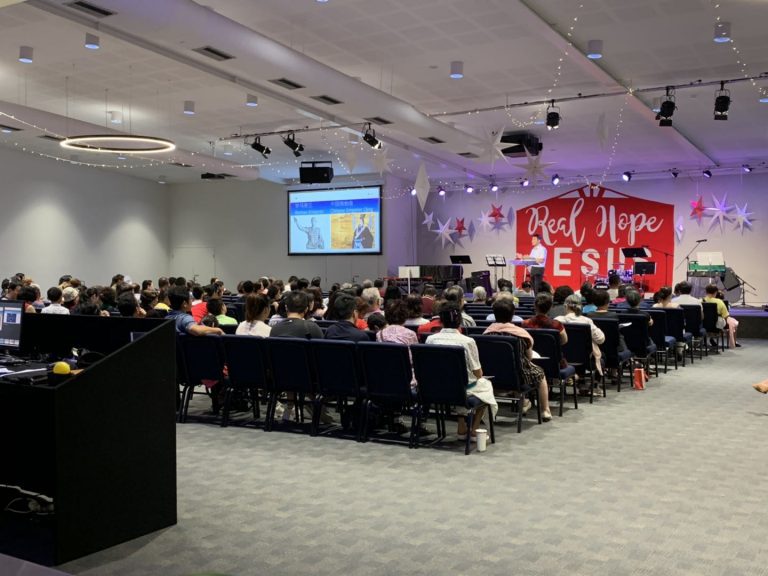When Kenny arrived at university in British Columbia, Canada in 2003, he knew no-one.
He was an overseas student from China. He was an atheist. There were very few people with Chinese background or language in his university town, Prince George. He was expecting to have to do everything by himself and for himself.
But God had other plans.
Kenny’s first home stay was with a Christian who invited him to church on his second day in Prince George. And because he was jet-lagged and couldn’t sleep, he said, ‘Okay, I’ll go with you.’
Nearly twenty years later, Kenny is still part of a church – but now the church is St Paul’s Carlingford in Sydney, and Kenny is an MTS apprentice.
So what was it that drew Kenny in as a jet-lagged, atheistic student on that first visit to church?
Patient discipleship
The first step was the personal invitation, of course. Then, when he got there, he was attracted by the music, which was very different from his ideas about ‘boring’ church services.
Kenny says, ‘I started to be interested in the worship band there, but couldn’t believe there was a God, because I had been trying to be an atheist for 19 years.’ He couldn’t believe in a God he couldn’t see.
But the pastor and other congregation members who ministered to Kenny were patient. They allowed him to ask his questions and express his doubts, and gradually Kenny began to realise that some things couldn’t be explained by science.
So he challenged himself to find out more; and God provided the answers: ‘Through Bible study in the young adults’ group, lots of learning, and the sermons on Sundays, I started to put my trust in the Lord.’
From China to Australia
Kenny returned to China, met and married his wife, and worked for five years for a missionary organisation based in the Netherlands. But the work was in the grey area in China, and when restrictions tightened, Kenny and his wife made the decision to leave. ‘We kept praying, and God brought us here, to Sydney.’

The Chinese church at St Paul’s Carlingford meeting together.
Danny Au Yeung is one of the ministers at St Paul’s Carlingford. When Kenny came to him in 2016 saying that he felt God calling him to be a full-time minister and proclaim the gospel, Danny had some wise advice. ‘Okay, slow down and don’t be so hurried. We need to get to know you, and you need to get to know the church.’ Danny suggested that after a few years, Kenny could start an MTS apprenticeship.
Danny knew what he was talking about. He left his career in computer engineering to become an MTS apprentice at St Andrew’s Cathedral, then trained at Moore College, and came to work at St Paul’s when he finished studying.
And just like Kenny’s first Canadian pastor, Danny knows how important it is to be patient in ministry – especially because of the unique challenges and opportunities presented by the Mandarin-speaking congregation that he ministers to at St Paul’s.
The uniqueness of Chinese ministry
In this ministry, Danny has learnt much about going slowly and allowing people to find out about the Christian faith in their own way. He comments that Chinese culture is a very communal kind of culture, so people from China checking out Christianity will often ‘like to see how the community operates and basically see whether your truth is actually real … [and] does change the way we operate and relate to each other.’
But then, of course, it’s important that people are led to see that ‘it’s not simply because we’re good that we do all these things; it’s actually that we’re driven by our beliefs.’ One example of this is the impact that volunteer ESL teachers at St Paul’s have on their attendees. As Danny says, people are often astonished by that generosity with time. ‘They just don’t believe that the teachers do all these things for free. We want to help them see it’s because of Jesus’ love we do these things.’
There are many other examples that Danny could tell you about where Chinese migrants may find Christian culture strange or unbelievable – aspects of Christian marriage, for example; or understanding that Christian practices and Australian culture are not one and the same; or balancing the drive for education and success in a new land with a focus on God and eternity. And it’s for this reason, he says, that patience is important. ‘To build up a new Chinese Christian, you also need to take time for them to actually understand the differences, put down the baggage, and live a Christian life.’
Heart languages
What Danny has also come to understand is that the best way to provide the time and the space for people to do this is to run ministries in the ‘heart language’ of the people who are seeking to know more about Christ.
We just want to create a space where people feel safe and supported to express themselves in their heart languages and then they can ask questions more easily, understand faith more easily … and get to the really deep layer, like spiritual thoughts and emotional thoughts. It’s really quite hard to express those things in another language.
I think there will always be a need for ministry unique to a person’s language or culture … rather than forcing them to overcome the English barrier first before they can get to know Jesus.
As Danny says, we all long for the day when all people gather together before God and language doesn’t matter – but we’re not in heaven yet!
At the same time, helping people express their faith in English is helpful as well – not just to communicate with English-speaking Christians, but for their own families – because, Danny says, ‘their kids will grow up as “second generations”, and, like it or not, their kids will be more Aussie than their own culture.’
Having the Mandarin-speaking ministry within the broader context of St Paul’s aims to meet this need, says Danny: ‘You have a mix of allowing the Chinese speakers to have their way of expressing their faith but, at the same time, in the English speaking context. We can have a lot of partnership together.’ And underpinning the partnership is the same faith; the same theology; the same gospel.
Kenny’s experience
This is certainly reflected in Kenny’s role as an MTS apprentice. While he describes himself as ‘a Mandarin MTS’, Kenny is actually involved in the broader congregation as well, so he can learn from the whole pastoral team and be engaged in a range of ministry work.
Kenny has learnt much from the team about the workload pastors carry, the time required to prepare a sermon, and what it looks like to pastorally care for a large number of people. He’s involved in service leading and the music team, and he’s also engaged in the ESL ministry, where he can talk to the students in their own language, unlike most of the volunteer teachers. As Kenny says, ‘Sometimes they go back home and they can bring that seed of the gospel, if we talk to them, back to China. It’s pretty unique.’
Encouragement for others
As Kenny points out, the next generation of Chinese people in Australia, like his own kids, won’t be able to speak Mandarin. Kenny thinks it’s vital that Mandarin speakers now – who are equipped with the language and cultural understanding that Kenny has – consider becoming MTS apprentices.
Why? Well, firstly, it’s a huge mission field. As more and more Chinese people have moved into suburbs like Carlingford, there has developed a need and an opportunity to reach out to a new group of people who may never have even heard of Jesus before.
But more than that: it’s a complex area of ministry – and not just because of language. It needs workers who understand the kinds of needs and barriers that exist like no-one else can.
Consider this: Kenny knows that he may never have heard of Jesus if he’d stayed in China. He knows first-hand what it’s like to have Christianity conflated in the history books with cautionary tales of westerners drugging Chinese people in order to capture, enslave and exploit them. He knows that the potential obstacles to faith for so many migrants from China go way beyond a simple language barrier. And he’s there to help.
Danny thinks that the apprenticeship model is still a new concept for some Chinese churches. But his hope is that more people will realise, like Kenny has, the value of a two-year training period before formal study, through which God can develop – and powerfully use – the knowledge and skills that are so needed in this unique ministry area.
Is Mandarin your first language and you are interested in doing an MTS apprenticeship ? Know someone you could encourage to look into it? Keen to support an MTS apprentice in this mission to our Mandarin-speaking brothers and sisters? Email us to find out more.
